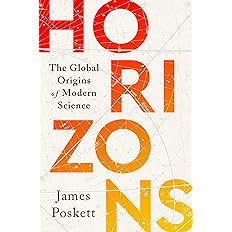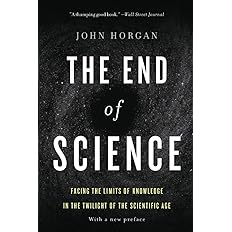Is Science Slipping Away on Us by Degrees?
Science writers weigh in on misrepresentation of science history, reasons for loss of trust, and whether physics is ripe for a revolutionScience writers have been thinking about the present and future position of science recently. Here are three interesting recent examples:
Is science just cultural knowledge?

In Horizons (Mariner 2022), University of Warwick science historian James Poskett argues that modern science did not really originate in Western Europe as often supposed: “Modern science wasn’t invented in Europe but came about as part of a global exchange”:
We are usually told that modern science was invented in Europe sometime between 1500 and 1700. This was an era in which a small group of European pioneers overturned ancient superstition and developed the first modern scientific theories. Think of Polish astronomer Nicolaus Copernicus and his heliocentric model of the universe or English mathematician Isaac Newton and his law of universal gravitation. This was the scientific revolution and it set the stage for what was to come: Europe continued to make incredible advances, leaving much of the rest of the world to catch up.
You are probably familiar with this story. It features in almost every popular account of the history of science. There is, though, one big problem with the idea that modern science was invented in Europe: it just simply isn’t true.
James Poskett, “We must recognise science’s unsung global pioneers to alter its future,” New Scientist 23 March 2022
Hmm. “It just simply isn’t true” is a bold statement — especially considering that popular accounts often depart radically from Poskett’s “straw man” script. They happily take us back to ancient India, Egypt, and Babylon because readers are interested in that. At Ars Technica, senior science editor John Timmer comments in response:
Astronomers in many countries figured out ways of calculating the patterns in the movements of planets and timing of eclipses. But there’s little indication that any of them recognized that those patterns reflected a small number of underlying principles or that their predictions could be improved by creating a mental picture of what was happening in the heavens. Without things like models and laws to pair with the observations they explain, can we really call this science?
John Timmer, “Globalism vs. the scientific revolution,” Ars Technica, November 18, 2023
The reason organized knowledge on its own is not enough to qualify as science is that science is not just a body of organized knowledge. It was assembled according to standards governing observations, experiments, and studies — standards undergirded by a philosophy of science. The idea of developing standards and philosophy first took hold in Europe. But of course it spread quickly among people across the globe who were interested in science because it produced reliable new knowledge. It’s not clear what interests are served by trying to fudge that history. It operates as one of the brakes against pseudoscience.
Science boosters can be science’s worst enemy
At Reason, J.D. Tucille discusses the continuing decline of trust in science, highlighting the role that self-importance has played:
But, like many institutions, science got political and cult-y. Thin-skinned narcissists with government jobs hijacked the systematic pursuit of knowledge and rebranded it as an unassailable body of Truth with a capital T. They cast out as heretics well-informed critics who interpreted evidence differently. In the process, they lost the trust of a public which saw insights replaced by bossy ideologues.
J.D. Tucille, “‘The Science’ Suffers from Self-Inflicted Political Wounds”, Reason, November 20, 2023
A key moment, as he notes, was Anthony Fauci telling CBS in 2021 that critics of his management of Covid were “really criticizing science because I represent science.” That is a claim no mortal should make. Who knows; it may have knocked several percentage points off public trust in science right there.
The end of science at hand? The truth may be worse
At Cross-Check, John Horgan revisits the “end of science” thesis that made him famous in 1996. The book The End of Science advanced the view that the big questions may have all been answered and the knowledge worth pursuing has become known. He stood by that view in a 2015 preface where he said that “Scientists have created a ‘map’ of reality, and a history of the cosmos and life on Earth, that is unlikely to undergo ‘radical revisions,’ because it is largely accurate.”

But now, revisiting today’s quantum theory, he has truly radical doubts:
But my ongoing quantum project has forced me to question a key premise of The End of Science, that science has given us an accurate map of reality. Yes, quantum mechanics accounts for countless experiments, and its applications have transformed our world, but it calls all our knowledge into question. Experts cannot agree on what quantum theory tells us about the nature of matter, energy, space, time, mind.
In The End of Science, I say particle physics “rests on the firm foundation of quantum mechanics.” Firm foundation? What a joke! The more I study quantum mechanics, the more physics resembles a house of cards. Floating on a raft. On a restless sea. Physics seems wobbly, ripe for revolution, for a paradigm shift that sends science veering off in unexpected directions.
John Horgan, “My Doubts about The End of Science,” Cross-Check, November 20, 2023
Revolution? Paradigm shift? What about fine-tuning of the universe for life? At this point, it makes much more sense than the “house of cards” alternative.
You may also wish to read: Pew: Post-COVID, trust in science dropped significantly Most other institutions have taken a hit in trust as well. What would it take for science in particular to pull out? Surely people in science need to recommit themselves to first principles like mathematics as a form of truth and evidence as the basis of biology.
